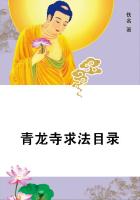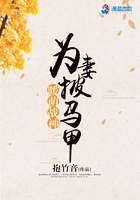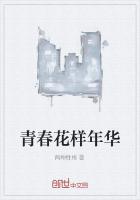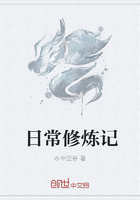He put his fingers into his purse, and brought out all the money he had in the world; it was one golden angel. "Look, friend," said he to the blacksmith; "if you will let me have your forge for one hour, I will give you this money for the use of it."
The blacksmith liked the tune of that song very well. "You may have it," said he; and he took off his leathern apron without another word, and Simon Agricola put it on in his stead.
Presently, who should come riding up to the blacksmith's shop but a rich old nobleman and three servants. The servants were hale, stout fellows, but the nobleman was as withered as a winter leaf.
"Can you shoe my horse?" said he to Simon Agricola, for he took him to be the smith because of his leathern apron.
"No," says Simon Agricola; "that is not my trade: I only know how to make old people young."
"Old people young!" said the old nobleman; "can you make me young again?"
"Yes," said Simon Agricola, "I can, but I must have a thousand golden angels for doing it."
"Very well," said the old nobleman; "make me young, and you shall have them and welcome."
So Simon Agricola gave the word, and Babo blew the bellows until the fire blazed and roared. Then the doctor caught the old nobleman, and laid him upon the forge. He heaped the coals over him, and turned him this way and that, until he grew red-hot, like a piece of iron. Then he drew him forth from the fire and dipped him in the water-tank. Phizz! The water hissed, and the steam rose up in a cloud; and when Simon Agricola took the old nobleman out, lo and behold! He was as fresh and blooming and lusty as a lad of twenty.
But you should have seen how all the people stared and goggled!--Babo and the blacksmith and the nobleman's servants. The nobleman strutted up and down for a while, admiring himself, and then he got upon his horse again. "But wait," said Simon Agricola; "you forgot to pay me my thousand golden angels."
"Pooh!" said the nobleman, and off he clattered, with his servants at his heels; and that was all the good that Simon Agricola had of this trick. But ill-luck was not done with him yet, for when the smith saw how matters had turned out, he laid hold of the doctor and would not let him go until he had paid him the golden angel he had promised for the use of the forge. The doctor pulled a sour face, but all the same he had to pay the angel. Then the smith let him go, and off he marched in a huff.
Outside of the forge was the smith's mother--a poor old creature, withered and twisted and bent as a winter twig. Babo had kept his eyes open, and had not travelled with Simon Agricola for nothing.
He plucked the smith by the sleeve: "Look'ee, friend," said he, "how would you like me to make your mother, over yonder, young again?"
"I should like nothing better," said the smith.
"Very well," said Babo; "give me the golden angel that the master gave you, and I'll do the job for you."
Well, the smith paid the money, and Babo bade him blow the bellows. When the fire roared up good and hot, he caught up the old mother, and, in spite of her scratching and squalling, he laid her upon the embers. By-and-by, when he thought the right time had come, he took her out and dipped her in the tank of water; but instead of turning young, there she lay, as dumb as a fish and as black as coal.
When the blacksmith saw what Babo had done to his mother, he caught him by the collar, and fell to giving him such a dressing down as never man had before.
"Help!" bawled Babo. "Help! Murder!"
Such a hubbub had not been heard in that town for many a day.
Back came Simon Agricola running, and there he saw, and took it all in in one look.
"Stop, friend," said he to the smith, "let the ******ton go; this is not past mending yet."
"Very well," said the smith; "but he must give me back my golden angel, and you must cure my mother, or else I'll have you both up before the judge."
"It shall be done," said Simon Agricola; so Babo paid back the money, and the doctor dipped the woman in the water. When he brought her out she was as well and strong as ever--but just as old as she had been before.
"Now be off for a pair of scamps, both of you," said the blacksmith; "and if you ever come this way again, I'll set all the dogs in the town upon you."
Simon Agricola said nothing until they had come out upon the highway again, and left the town well behind them; then--" Born a fool, live a fool, die a fool!'" says he.
Babo said nothing, but he rubbed the places where the smith had dusted his coat.
The fourth day of their journey they came to a town, and here Simon Agricola was for trying his tricks of magic again. He and Babo took up their stand in the corner of the market-place, and began bawling, "Doctor Knowall! Doctor Knowall! Who has come from the other end of Nowhere! He can cure any sickness or pain! He can bring you back from the gates of death! Here is Doctor Knowall! Here is Doctor Knowall!"
Now there was a very, very rich man in that town, whose daughter lay sick to death; and when the news of this great doctor was brought to his ears, he was for having him try his hand at curing the girl.
"Very well," said Simon Agricola, "I will do that, but you must pay me two thousand golden angels."
"Two thousand golden angels!" said the rich man; "that is a great deal of money, but you shall have it if only you will cure my daughter."
Simon Agricola drew a little vial from his bosom. From it he poured just six drops of yellow liquor upon the girl's tongue.
Then--lo and behold!--up she sat in bed as well and strong as ever, and asked for a boiled chicken and a dumpling, by way of something to eat.
"Bless you! Bless you!" said the rich man.
"Yes, yes; blessings are very good, but I would like to have my two thousand golden angels," said Simon Agricola.
"Two thousand golden angels! I said nothing about two thousand golden angels," said the rich man; "two thousand fiddlesticks!" said he. "Pooh! Pooh! You must have been dreaming! See, here are two hundred silver pennies, and that is enough and more than enough for six drops of medicine."
"I want my two thousand golden angels," said Simon Agricola.















